- Home
- Paula McLain
The Paris Wife: A Novel Page 12
The Paris Wife: A Novel Read online
Page 12
“All right,” I said.
He rose and dressed. It must have been three o’clock in the morning, or maybe four.
“You’re not going to work now?”
“Maybe not,” he said. “But I’m going to try.”
I heard him leave, his steps on the stairs, all the way down, and then fell asleep for a few hours. When I woke up he was still away working, and it was already hot and close in the apartment. I kicked the bedsheet away and put my robe on and went into the kitchen to make the coffee. Musicians from the night before were still in the street and it made me feel tired just to hear them. I didn’t know how they managed to keep playing. Did they sleep standing up in doorways? Did they sleep at all?
After breakfast, I washed and dressed and sat at the piano for a few hours, but it wasn’t satisfying work. The day was too hot and I was too distracted by the night before. I lay down again, and then heard Marie Cocotte in the kitchen, clearing dishes. We’d gotten her name from the concierge in our building, and now she came in every morning as our femme de ménage, taking care of all the washing and cooking for two francs an hour. Marie was childless and nearing middle age, petite and sturdy, with quick and competent hands. She’d earned her nickname, cocotte, which was French slang for “wench,” from a dish she made often and beautifully for us, poulet en cocotte. Several days a week, she returned in the late afternoon to prepare our dinner, and because she made everything so well, I’d asked her to teach me French cooking. But now that it was high summer, I didn’t want to be in the kitchen at all and was happy to eat fruit or nothing until Ernest was finished with his work. Then we’d go to a café for an aperitif when it was dark and much cooler and felt right again to eat and be hungry.
“Good morning, madame,” Marie Cocotte said, coming into the bedroom where the curtains were still open from the night before. We’d never closed them.
“Will the music ever stop?” I asked in my still-graceless French, pointing to the window.
“Not today,” she said, laughing.
“I think Bastille Day will last forever,” I said, and she laughed again.
“That is how we like it,” she said.
The summer stretched on this way, becoming several summers in a row, with time not moving at all. The days grew harder to fill. I felt my headaches coming back, and though I knew I shouldn’t resent Ernest’s working or try to keep him from it, I was always happiest when he woke up and said he wasn’t going to try to write at all that day, and that we should go to the boxing matches instead, or drive out to the country to see the bicycle races.
One afternoon Gertrude and Alice invited us to lunch at their country house in Meaux. We went out all together, in Gertrude’s Model T, and had a picnic feast with two kinds of eggs and potatoes and roast chicken. We drank several bottles of chilled wine and then three-star Hennessy, and everything was beautiful—the valleys and bridges, the charming house and its flowering trees. After lunch, we lay in the grass and talked and felt free.
Ernest had taken to showing Gertrude all of his work, and reading hers as well. Though he’d felt put off by the difficulty of her writing at the beginning of their friendship, he’d grown to appreciate the strangeness of it and was becoming more and more interested in what she was doing. She even began to influence his style, particularly the habit she had of naming and repeating concrete objects, places, and people, not trying to find variation, but reveling in how any word took on a striking power when you used it again and again. In some of the new Nick Adams passages, I saw how he was doing this, too, with the simplest language and things—lake, trout, log, boat—and how it gave the work a very distilled and almost mythic feel.
Ernest’s connection to Gertrude was obviously very important to them both, and I loved that we were all becoming good, easy friends with one another, though there was still a persistent pairing off when we met. Ernest and Gertrude were the artists, and when they talked, their heads close together, they seemed almost like siblings. Alice and I were the wives, even without the four walls of the salon to define us, and she seemed content with this. Was I? Ernest utterly supported my playing and often referred to the piano as my “work,” as if I were an artist, too. I loved to play and felt it was very much a part of my life, but I wasn’t at all convinced I was special, as Ernest was. He lived inside the creative sphere and I lived outside, and I didn’t know if anything would ever change that. Alice seemed to feel easier in her role as an artist’s wife, throwing herself wholly behind Gertrude’s ambition, but maybe she’d just been doing it longer and could hide her jealousy better. I gazed into my glass of brandy—at the kaleidoscope it made on the pale blanket, which was some kind of Irish wool. We were here together now, I told myself. Everything was lovely and fine. I should just know it and hold on to it and be happy. I would. I would try.
The next day we woke late and I still felt the Hennessy. Ernest must have been feeling it, too, because we weren’t even out of bed yet before he said, “The work won’t be any good at all today. I shouldn’t bother.”
“You could go and try anyway, just for a few hours,” I said, feeling a small sting because I didn’t mean it.
“No,” he said. “It won’t come to anything. I already know.”
We rose and had our breakfast, and then decided we would go out to Auteuil, to the horse races. It would be cooler out of the city. Marie Cocotte would pack a basket with sandwiches and wine, and then we’d get the racing forms and read them on the train. As soon as it was settled, I felt the pressure in my head leave, whooshing out quickly like a ghost being exorcised from a house. I felt guilty for how happy it made me not to share him—guilty and happy, all at the same time.
Ernest and I both loved Auteuil. We always went over the racing form together and then visited the paddocks to see the animals. I loved the deep smell of the horses and the track itself and the noises of the happy crowd taking its luck as it came. Ernest was fascinated by everything—the beautiful rippling of horse flesh, the stumpy-looking jockeys in their silks, the trainers standing at the rails and seeming to know something mysterious, the slang of the boys in the stable, and the smell of horse piss. We never had a lot to spend at the races, but we always had something, and it felt good to be out together in the sun. Ernest would spread his coat in the grass and we’d lunch there, and then I’d nap or just watch the clouds and wait for the next race. When we won, we had champagne, and sometimes when we lost, too, because we were happy to be there and be together, and what was money to us anyway? We never had enough to make a difference if we lost it.
That day, the favorite was a shiny dark beauty, a good jumper with a quick way. He had tight sharp lines on the jump, making you think you’d barely seen it at all. We didn’t bet on the favorite, but on another, lighter horse called Chèvre d’Or that was running a hundred and twenty to one. Sometimes we picked the horses together, after walking the paddock or standing at the rails and seeing how the horses moved and waiting for a feeling. Sometimes Ernest found someone he knew who’d give him a name or two, good odds. That day I followed my own hunches and found the horse myself. I could be lucky for us that way. It had happened before, and that day I felt sure it would happen again. Chèvre d’Or wasn’t quick and dark but moved like brandy in a glass. I watched his smooth legs and told Ernest he was the one.
“Let’s really bet on him,” I said. “Do we have enough?”
“Maybe we do,” he said.
“Let’s spend it anyway, even if we don’t.”
He laughed and went off to place the bet, still smiling at me. He loved it when I was bold.
“Are you still stuck on this horse?” he asked when he came back.
“I am.”
“Good. He’s got six months of living expenses on him.”
“You don’t mean it.”
“I do,” he said, and we crowded up to the rail with the rest, both of us tingling with risk.
My horse took the lead from the start. By the second hurdle, n
othing could touch him. He was four lengths ahead by the fourth hurdle, a brandy-colored blur.
“He’s doing it,” I said, feeling flushed. My stomach was taut and knotted.
“He’s doing it all right,” Ernest said, watching the other horses break. But it was too late for any of them because Chèvre d’Or was too fast and too far ahead—too good as he was, ten lengths ahead, then more. The favorite gained and took the others, his jockey’s whip slicing, but my horse was in his own race.
He was twenty lengths ahead and twenty paces from the finish when it happened. As beautiful as the rest had been, that’s how ugly it was when he fell at the last jump. If he was brandy before, now he was a busted wheelbarrow. He was sticks and string, a child’s toy breaking with a crack. It was so terrible, I couldn’t watch. I buried my face in Ernest’s shoulder and didn’t see the end of the race, the horses parting around the fallen animal, the favorite taking everything he hadn’t earned.
I cried half the way home on the train, through the gloomy neighborhoods with the clotheslines and the garbage and the children dressed in rags, trying to forget the day and what we’d seen.
SEVENTEEN
hen our first anniversary came, we decided to spend it with Chink, in Cologne, and took a boat down the Rhine to meet him. The weather was still very warm then, and the days were lovely and long, and when we met up with Chink we were all very happy to be together. He was good for us, and we were good for him, and Cologne was beautiful.
One afternoon I was lying back on the grass watching Ernest and Chink fish. Ernest reached into the duffel bag on the bank next to him and pulled out a bottle of cold white wine that he uncorked with his teeth. In his other hand he held the rod, its line well out, the water moving around it in gentle eddies. There was a nice breeze, and yellow pollen blew by in small clouds and sifted down on us from the trees.
“You boys look like something out of a painting,” I said, squinting up at them.
“We have an admirer,” Ernest said to Chink.
I got up out of the grass and walked over to Ernest and watched him closely for several minutes. “Show me how it’s done,” I said.
“Tired of admiring already?”
“No.” I smiled. “But I’d like to give it a try.”
“All right, then.” He stood behind me on the soft, grassy bank and showed me how to point the rod. I swung my arm back and forward again in a smooth arc, just as he said, and managed to release the reel perfectly. It sailed out into the current like a dream.
“That felt good,” I said.
“That’s how you know you’ve done it right,” Chink said.
“What now?”
“Now you wait,” Ernest said, and walked over to the rod case. Before he’d even reached it I felt a small tug at the line, then another stronger tug. On instinct, I pulled up and the hook struck. I could feel the fish working against it.
“Hey,” Chink said, watching. “She’s a ringer.”
Ernest rushed back and helped me land the trout, and then the fish was on the grass, pale brown and spotted.
“I feel a little sorry for him,” I said.
“You can throw him back if you’d like,” Chink said.
“Like hell she will,” Ernest said, laughing.
“No, I want to eat him. I want to know if it tastes different when you catch it yourself.”
“Good girl,” Ernest said. “It does, you know.”
“I thought so.”
“This one’s got the killer instinct,” Chink said, and we all laughed.
“You might as well know it all,” Ernest said later when I had landed three trout, one after the other. He showed me how to clean and gut the fish and rinse the body well in the stream for cooking.
“I’m not disgusted,” I said as we worked.
“I know it. I can tell.”
We roasted my three over the fire on sticks, as well as the other half dozen Chink and Ernest had caught between them.
“I like mine best,” I said, licking salt off my fingertips.
“I like yours best, too,” Ernest said, and opened another bottle of wine as the sky softened and evening came on.
In Cologne itself, the mood was more troubled. At the British Occupation Garrison, where Chink had recently been stationed, an angry mob had vandalized a statue of Wilhelm II on horseback, wrenching down the huge iron sword and shattering off the spurs. Other rioters had murdered a German policeman, chasing him into the river and then severing his fingers when he tried to hold on to a bridge to save himself. From a distance, the city looked like something out of a fairy tale with red-roofed houses and villagers dressed in lederhosen, but like the rest of Allied-occupied Germany, it was in a state of supreme unrest.
A few days later, on September 14, we were in a café catching up on our newspapers when we learned that the Turkish port city of Smyrna was burning. The Greco-Turkish war had been raging for three years, since the repartitioning of the Ottoman Empire that came out of the war, but the conflict had finally broken with this fire. No one knew who was responsible. The Greeks blamed the Turks and vice versa, and the only clear thing was the tragic results. The harbor had been set alight with petroleum, as had many of the Greek and Armenian quarters in the town. People were driven out of their houses and into the streets. Scores drowned in the harbor, and others were slaughtered where they stood. Refugees were fleeing into the hills. We felt very chastened where we sat in the café, having our fine lunch, for not having been more aware of the conflict.
“I imagine I’ll be there soon enough,” Chink said. His expression was stern.
“Maybe I will, too,” Ernest said, and I felt a cold rush go through me.
“You don’t really think so,” I said.
“I don’t know. It’s possible.”
“I’ve always wanted to see Istanbul,” Chink said.
“Constantinople’s a better word, though,” Ernest said. “Or Byzantium.”
“Right,” Chink said. “Well, either way, it’s in the crapper now, isn’t it?”
Back in Paris, we hadn’t even unpacked before a telegram came for Ernest from the Star. John Bone was sending him to Turkey to report on the conflict, just as he’d suspected. He would leave in three days’ time. He’d just read the news, the torn envelope still in his hands, when I felt myself come crashing down.
“What is it?” Ernest said, watching my face fall. “I won’t be long. It will be like Genoa, the same as that. And then I’ll be home and we’ll be together again.”
But I had never told him about how low I’d been when he was away in Genoa, how every day without him had been a struggle against myself.
“I don’t want you to go,” I said.
“What?”
“Tell them you can’t, that I’m ill.”
“You’re not making any sense.”
“But I am, don’t you see? I’m telling the truth for once.”
“No, you’re being childish. This is a tantrum, and I want you to stop it now.”
That’s when I began to cry, which was worst of all; he hated tears.
“Please stop,” he said. “We’ve just had a wonderful time in Cologne, haven’t we? Why can’t we just be happy?”
“That’s all I want,” I said, but the tears still came. I opened my suitcase, then closed it again and went into the kitchen to boil water for tea. I thought maybe he’d gone into the bedroom, but he was there, just behind me, pacing.
“It’s too far away,” I finally said.
“That’s the point, isn’t it? You don’t want a war breathing down your neck.”
“Can’t we just pretend the telegram never came?”
“No, we can’t.” His face grew suddenly hard then, because I was asking him to choose me over his work. “To hell with the tea,” he said, but I kept at it, measuring leaves for the pot and pouring water through the porcelain sieve. He strode back and forth behind me in the tiny kitchen, waiting for me to apologize. When I didn’t and d
idn’t even turn around, he finally stormed out of the apartment.
I knew he’d gone to a café. I could have found him easily and it might have been fine, then, if I had. We could have had a brandy and water and agreed to put it behind us. Or asked the waiter to bring the absinthe and let it erase everything beautifully. But I stayed where I was and drank the damn tea, though I didn’t even want it.
By the time Ernest came home, I was drunk and pretending to sleep. I’d abandoned the tea and taken up a bottle of whiskey instead. I’d eaten nothing, and just drank the whiskey, several glasses, warm without water. When I was drunk enough to do it, I took up the lovely china teapot which had come so far with us and let it drop to the floor with a crash. I meant to leave the pieces there for him to see, but once I’d done it, it was too small and childish—the act of a tantrum, like he’d said. I hated feeling so desperate and out of control, but couldn’t seem to rein it in either. I picked up the mess, one wet ruined shard at a time, and put it in a small paper sack. Then I went to bed. My head swam viciously on the pillow, but I closed my eyes and tried to slow my breathing. Much later, I heard him on the stairs, then in the room.
“Hadley,” he said, sitting next to me on the bed. He touched my face and neck lightly, but I didn’t move. “Let’s don’t do this, Feather Cat.”
I pinched my eyes tight to keep the tears from coming, and tried to appear as if I were sleeping. But he knew I wasn’t.
“Damn you,” he said, when I wouldn’t open my eyes or answer him. He gave my shoulder a rough shove. “It’s the job. You know I have to go.”
“You don’t have to. You want to go.”
“To hell with you anyway,” he said, and left to sleep elsewhere.
Maybe he went back to his room on the rue Descartes that night or slept on the long bench downstairs in the dance hall. I don’t know. He stayed out until after noon the next day, and then came in to pack and make arrangements. He moved around the apartment, throwing things into a bag, getting his notebooks together.

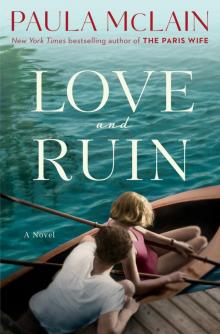 Love and Ruin
Love and Ruin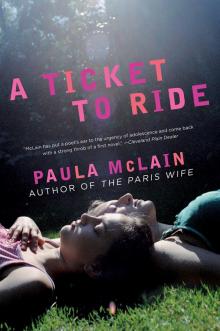 A Ticket to Ride
A Ticket to Ride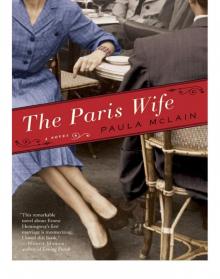 The Paris Wife
The Paris Wife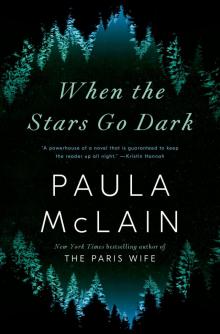 When the Stars Go Dark: A Novel
When the Stars Go Dark: A Novel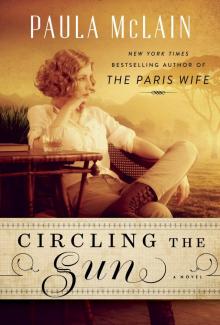 Circling the Sun
Circling the Sun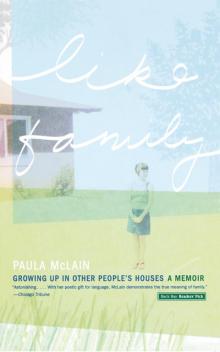 Like Family
Like Family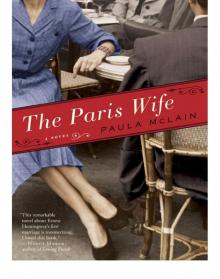 The Paris Wife: A Novel
The Paris Wife: A Novel